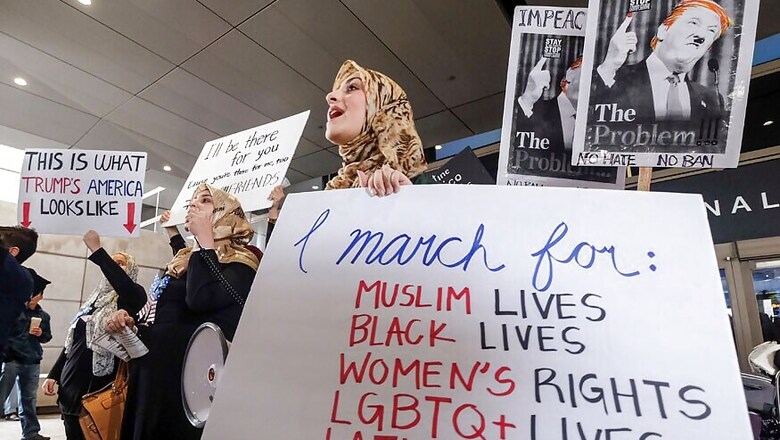
views
US President Donald Trump suffered a legal blow on Thursday when a federal appeals court refused to reinstate a temporary travel ban he had ordered on people from seven Muslim-majority countries.
A three-judge panel of the 9th US Circuit Court of Appeals unanimously ruled that the Trump administration failed to offer any evidence that national security concerns justified immediately restoring the ban, which was launched late last month.
Shortly after the court issued its 29-page ruling, Trump tweeted: "SEE YOU IN COURT, THE SECURITY OF OUR NATION IS AT STAKE!" He told reporters his administration ultimately would win the case and dismissed the ruling as "political."
SEE YOU IN COURT, THE SECURITY OF OUR NATION IS AT STAKE!— Donald J. Trump (@realDonaldTrump) February 9, 2017
The court was only ruling on the narrow issue of whether or not to lift an emergency halt to Trump's order put in place by a lower court while that case is ongoing. The judges said more briefing would be needed on the merits of the arguments on both sides.
The states of Washington and Minnesota challenged Trump's order, which had sparked protests and chaos at U.S. and overseas airports on the weekend after it was issued. The two states argued that Trump’s ban violated constitutional protections against religious discrimination.
Asked about Trump's tweet, Washington state Attorney General Bob Ferguson said: "We have seen him in court twice, and we‘re two for two."
While the court said it could not decide whether the order discriminated against a particular religion until the case had been “fully briefed," it added that the states had presented evidence of “numerous statements” by the president “about his intent to implement a ‘Muslim ban.’”
The administration argued that the courts do not have access to the same classified information about threats to the country that the president does. The judges countered that “courts regularly receive classified information under seal.”
The 9th Circuit ruling, upholding last Friday's decision by US District Judge James Robart, does not resolve the lawsuit. It relates only to whether Trump's order should be suspended while litigation proceeds. The ruling upholds the suspension.
Trump's Jan. 27 executive order barred entry for citizens from Iran, Iraq, Libya, Somalia, Sudan, Syria and Yemen for 90 days and imposed a 120-day halt on all refugees, except refugees from Syria who are barred indefinitely.
The three judges said the states had shown that even temporary reinstatement of the ban would cause harm.
In the ruling, they acknowledged the competing public interests of national security and free flow of travel but that the U.S. government had not offered "any evidence" of national security concerns to justify banning the seven countries.
FINAL OUTCOME 'NOT CERTAIN'
Curbing entry to the United States as a national security measure was a central premise of Trump's 2016 presidential campaign, originally proposed as a temporary ban on all Muslims. He has voiced frustration at the legal challenge to his order.
U.S. presidents have in the past claimed sweeping powers to fight terrorism, but individuals, states and civil rights groups challenging the ban said his administration had offered no evidence it answered a threat.
Two of the three 9th Circuit judges were appointees of former Democratic Presidents Jimmy Carter and Barack Obama, and one was appointed by former President George W. Bush, a Republican like Trump.
The government could ask the 9th Circuit to have a larger panel of judges review the decision "en banc," or appeal directly to the U.S. Supreme Court, which will likely determine the case's final outcome.
If the Trump administration appeals to the Supreme Court, it would need five of the eight justices to vote in favour of a stay blocking the district court injunction. That is likely to be a tall order as the court is evenly divided 4-4 between liberals and conservatives, meaning the administration would need to win over at least one of the liberal justices.
"There is no doubt that the plaintiffs won an important victory today," said Boston College Law Professor Kari Hong. "But the outcome of the legal challenge to the travel ban is not at all certain or preordained."

















Comments
0 comment